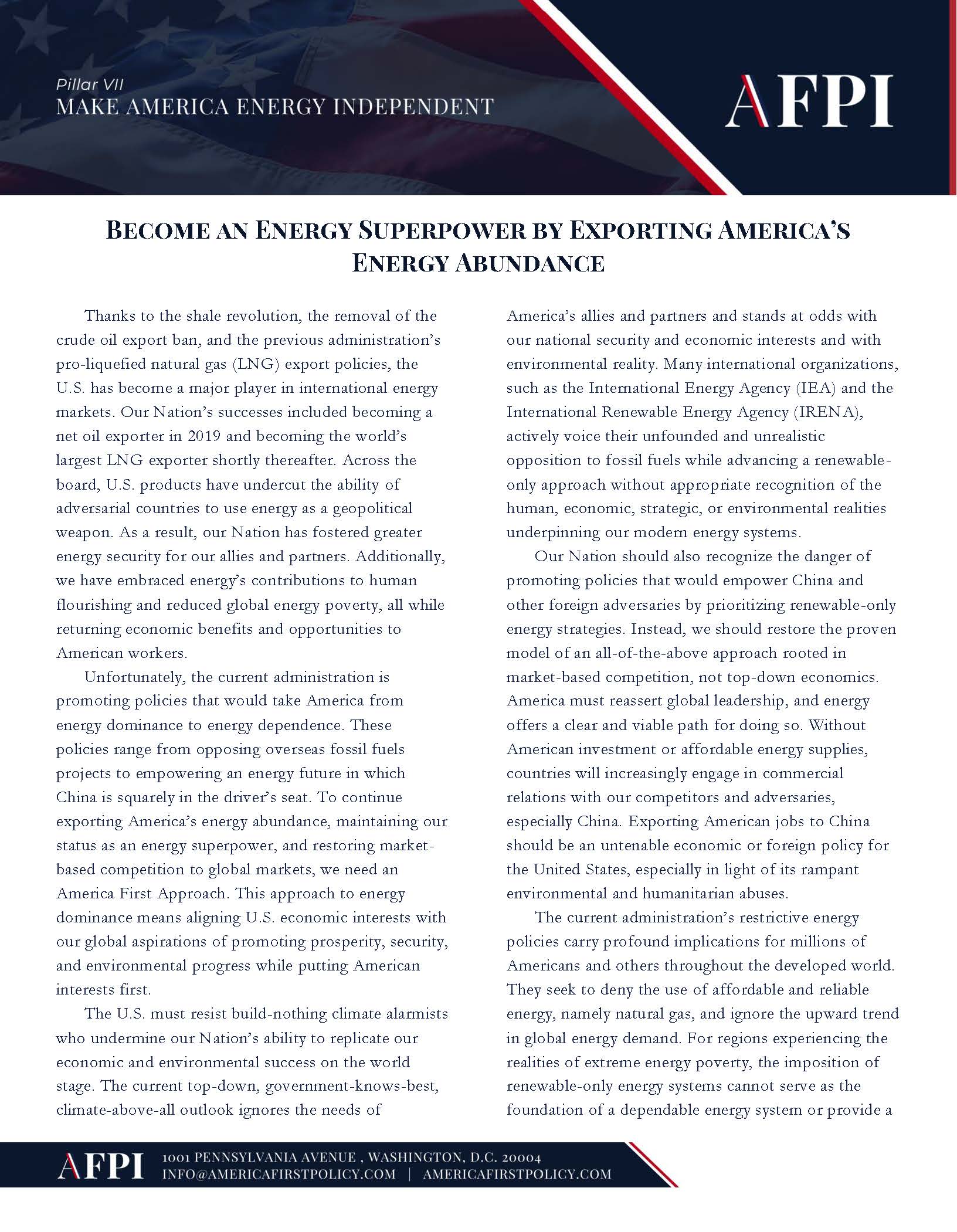Pillar VII: Make America Energy Independent
Become an Energy Superpower by Exporting America’s Energy Abundance
Thanks to the shale revolution, the removal of the crude oil export ban, and the previous administration’s pro-liquefied natural gas (LNG) export policies, the U.S. has become a major player in international energy markets. Our Nation’s successes included becoming a net oil exporter in 2019 and becoming the world’s largest LNG exporter shortly thereafter. Across the board, U.S. products have undercut the ability of adversarial countries to use energy as a geopolitical weapon. As a result, our Nation has fostered greater energy security for our allies and partners. Additionally, we have embraced energy’s contributions to human flourishing and reduced global energy poverty, all while returning economic benefits and opportunities to American workers.
Unfortunately, the current administration is promoting policies that would take America from energy dominance to energy dependence. These policies range from opposing overseas fossil fuels projects to empowering an energy future in which China is squarely in the driver’s seat. To continue exporting America’s energy abundance, maintaining our status as an energy superpower, and restoring market-based competition to global markets, we need an America First Approach. This approach to energy dominance means aligning U.S. economic interests with our global aspirations of promoting prosperity, security, and environmental progress while putting American interests first.
The U.S. must resist build-nothing climate alarmists who undermine our Nation’s ability to replicate our economic and environmental success on the world stage. The current top-down, government-knows-best, climate-above-all outlook ignores the needs of America’s allies and partners and stands at odds with our national security and economic interests and with environmental reality. Many international organizations, such as the International Energy Agency (IEA) and the International Renewable Energy Agency (IRENA), actively voice their unfounded and unrealistic opposition to fossil fuels while advancing a renewable-only approach without appropriate recognition of the human, economic, strategic, or environmental realities underpinning our modern energy systems.
Our Nation should also recognize the danger of promoting policies that would empower China and other foreign adversaries by prioritizing renewable-only energy strategies. Instead, we should restore the proven model of an all-of-the-above approach rooted in market-based competition, not top-down economics. America must reassert global leadership, and energy offers a clear and viable path for doing so. Without American investment or affordable energy supplies, countries will increasingly engage in commercial relations with our competitors and adversaries, especially China. Exporting American jobs to China should be an untenable economic or foreign policy for the United States, especially in light of its rampant environmental and humanitarian abuses.
The current administration’s restrictive energy policies carry profound implications for millions of Americans and others throughout the developed world. They seek to deny the use of affordable and reliable energy, namely natural gas, and ignore the upward trend in global energy demand. For regions experiencing the realities of extreme energy poverty, the imposition of renewable-only energy systems cannot serve as the foundation of a dependable energy system or provide a reliable basis for economic growth. Any such policy is nothing short of climate colonialism. When our policies constrain U.S. commercial actors, our adversaries are all too willing to step in.
We have the resources to lead the world in eradicating global energy poverty while strengthening our own energy security and that of our allies and partners. Our Nation can do so while returning benefits to American workers and families. However, private capital must be liberated from policy constraints to support energy infrastructure from production to delivery, regardless of energy source. U.S. export regulations must also be streamlined to foster greater market certainty.
THE FACTS
- In 2019, the U.S. became a net energy exporter while leading the world in CO2 emissions reductions.
- In 2021, the U.S. became the world’s leading LNG exporter, experiencing a 1,800% increase since 2016.
- Fossil fuels make up more than 80% of the global energy mix and are projected to remain a dominant player through 2050.
- Two-thirds of America’s natural gas reserves are located in the Appalachian region’s Utica and Marcellus shale deposits.
- 10% of the world’s population lives without access to electricity, of which nearly half are located in sub-Saharan Africa.
- The Biden Administration has doubled the Obama Administration’s initial emissions targets. The previous targets have been estimated to cost the U.S. economy 2.7 million jobs by 2025 and as much as 6% of GDP annually by 2030.
REFERENCES
Annual Energy Outlook 2022, U.S. Energy Information Administration (March 2022).
Global CO2 Emissions in 2019, International Energy Agency (Feb. 2020).
How the World Really Works: The Science Behind How We Got Here and Where We’re Going by Vaclav Smil (2022).
Liquefied U.S. Natural Gas Exports, U.S. Energy Information Administration (May 2022).
Pushing out or Pulling in? The Determinants of Chinese Energy Finance in Developing Countries, Energy Research & Social Science, Vol. 86 (2022)
Putting Africa on the Path to Universal Electricity Access, World Bank Blogs (Jan. 2022).
The Need to Refocus International Efforts on Traditional Air Pollutants, America First Policy Institute (March 2022).
U.S. Posts First Month in 70 Years as a Net Petroleum Exporter by Stephen Cunningham, Bloomberg (Nov. 2019).
Why U.S. Energy Policy Must Promote American Energy Dominance, America First Policy Institute (Sept. 2021).
World Energy Outlook 2021, International Energy Agency (Oct. 2021).
